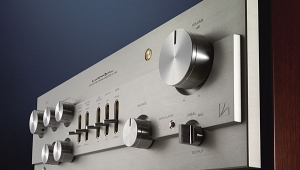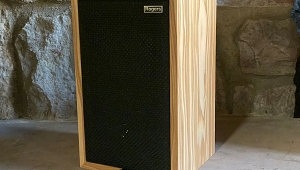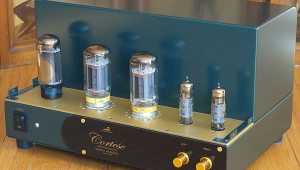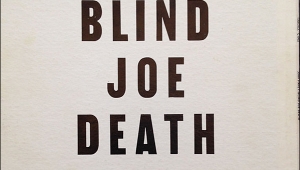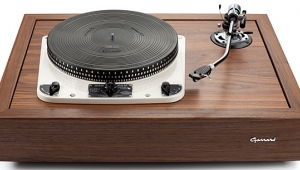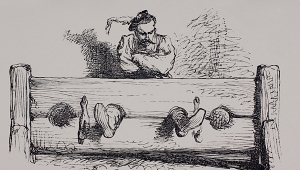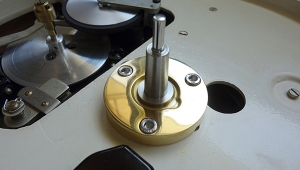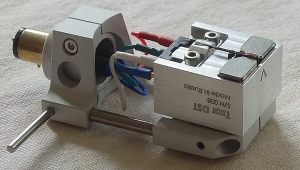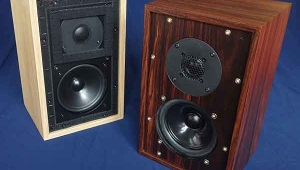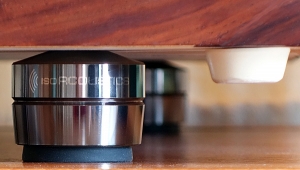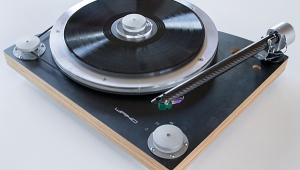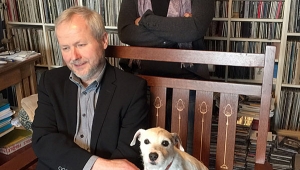| Columns Retired Columns & Blogs |
Listening #19
All the world, even you
Should learn to love the way I do—Bryan Ferry, "Take a Chance with Me"
Should learn to love the way I do—Bryan Ferry, "Take a Chance with Me"
My daughter, who's just turned six, surprised me by asking to have a radio in her room. I was happy to oblige, so I stopped what I was doing and went straight upstairs to the guest room to fetch the Tivoli Audio Henry Kloss Model One [reviewed by Sam Tellig in March 2001—Ed.] I'd bought a few years ago. I dusted it off, shook a few dead ladybugs out of the recess on its back panel—they pry their way into our house by the thousands before the weather goes cold—and brought it down to Julia's bedroom.
The radio, which sells for $100 and looks "collegiate" in the Dobie Gillis sense of the word, clashed with the room's other furnishings, including a bright red-and-yellow Lego table and matching chairs (one of the latter can be glimpsed in the photo on p.41 of the May 2004 Stereophile), a shiny pink Hello Kitty hatbox that would not be out of place in Elton John's dressing room, and a Tweety Bird night light. My little girl is growing up, but not all at once.
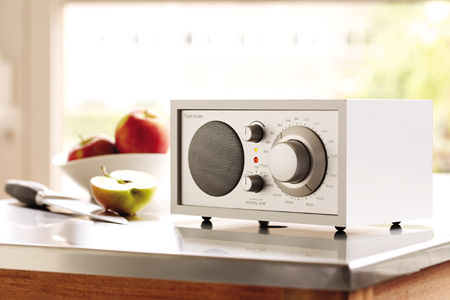
I switched on the radio, and Bobby Darin's wonderful "Beyond the Sea" filled the room: an easy-listening station out of Albany. I offered to find something else on the dial, but Julia stood firm: "No, Daddy. I like that." I smiled, kissed the top of her head, and left the room. My daughter shut the door tightly behind me—the first of a million times, I suppose.
I needn't have felt so sorry for my baggy self, because in a few minutes the door was open again: "Daddy! Daddy! Come quick! They're playing your favorite song!" It was Frank Sinatra singing "It Was a Very Good Year"—which I do like a lot, and which impressed my daughter the first time she heard the record. She even sings it to herself sometimes, in that freeform way that children have: "It was a very good year / for girls with blue blood / who wear pink dresses / da da da da..."
Julia had listened to that song on the hi-fi at least a dozen times, but this was the first time it had sent her into the ionosphere. By the second verse, she'd picked up the cat, brought it into her bedroom, and was cooing, "This is the best song in the world, Ginger! The best, best song!" My daughter found out—learned but didn't learn, just like the rest of us—that hearing a familiar piece of music on the radio makes us listen in a different way, perhaps more so than hearing it live (were such a thing still possible). Francis Albert never sang it to more than a few thousand people at a time, but this deejay was sending it out to millions. With love.
I thought of the many times I'd felt the same thing. When I was 16, I was lucky enough to own most of the 45rpm singles that the Beatles had released so far, and unless someone else in the family was using the record player, I could listen to any one of them at home more or less at will. That was fine, but never quite as fine as when my friends and I slept out at the reservoir and one of us brought a transistor radio. With the right weather conditions and a little luck, we could pick up the really big stations from New York or even Cleveland. Was there anything better than being 16 in 1970 and hearing "Get Back" on an AM broadcast from an important city? Not that I can recall.
The trick was repeated countless times over the years, with more or less equal success. One night, not long before Julia was born, my wife and I were in the middle of a miserable, rainy drive when I turned on the radio, looking for a classical station. I chanced on some music that was equal parts familiar and exotic, and which, I realized a moment later, was in fact Mahler's Symphony 8, a work I'd listened to a number of times but hadn't really clicked with. Hearing this live broadcast compelled me to listen to it anew when we returned home. It's been near the top of the pile for me ever since.
I suppose it's equal parts validation, randomness, and the sheer human delight at hearing or seeing something in a context other than what you're used to—the latter, of course, being at the core of most art. Perhaps a bright 16-year-old would have recognized all that, but not me. I was too stupid then to realize that the canned-music experience would never get much better than it was when I was 16—just as I'm too stupid now to let people who don't know anything about my relationship with music tell me what is and isn't important in sound reproduction.
If I'd thought about it, I might have resisted the temptation to become an audiophile. I see now that my interest in the hobby was driven not only by a love of good sound (and a desire for record-playing gear that was gentle on my already flourishing collection), but by materialism as well. I've also learned that there's a component to the appreciation of art, especially popular art, that isn't personal or private—and that's the enjoyment that comes from knowing there are other people, just like me, who are trying to make sense of the same things.
Listening to a transistor radio at age 16 was about being part of something big. Everything I've done since then has been, wittingly or not, a move in the opposite direction: my one-person sweet spot, my needle only I know how to clean, my amp only I'm allowed to touch, my room where the cat can't go. Today I'll listen to a rare bootleg outtake of Captain Beefheart's "Big Eyed Beans from Venus," where Zoot Horn Rollo's feedback sounds different from the official release; tomorrow I'll listen to a live Furtw;dangler recording that even his widow and the Japanese don't know exists. Hooray for me: I'm part of something small.
Don't get me wrong: I'm happy to be an audio enthusiast. I've made peace with it. I'm thankful for most of the ways in which the hobby has enhanced my listening enjoyment. I even take some pride in knowing our industry has contributed to the preservation and enhancement of our heritage of recorded music and speech. But when I hear some audiophiles talk about their more "sophisticated" listening skills, and how they think more people should learn how to listen that way, I'm reminded of why some music lovers disdain us, and that the unsophisticated listener has at least as much to teach us as the other way around. Get back, indeed.
But I couldn't leave it there...
"Daddy, they're playing 'Chips Ahoy'! Do you know that song?"
"No sun for a couple days! That's what the radio said!!"
"Daddy! Call them up and tell them to play Barbie and the Nutcracker...!"
I decided to reclaim the Tivoli for a week, and to try it in my newly remodeled private off-limits go-away no-gurls-allowed listening room.
This had been, in fact, part of my evil plan all along: My listening space was a master bedroom in its previous life, and part of my remodeling job involved removing the clothes closet so that I could have a perfectly rectangular room. I succeeded in doing that and patching the drywall without much trouble, but I found one thing I hadn't noticed before: an opening to the attic in the closet ceiling. I decided to keep it rather than patch it over, even though the attic is virtually unusable. I also decided, before that opening would be all but blocked by the 7'-tall record cabinets destined to go underneath, to put something up there: a six-element RadioShack FM antenna.
- Log in or register to post comments

